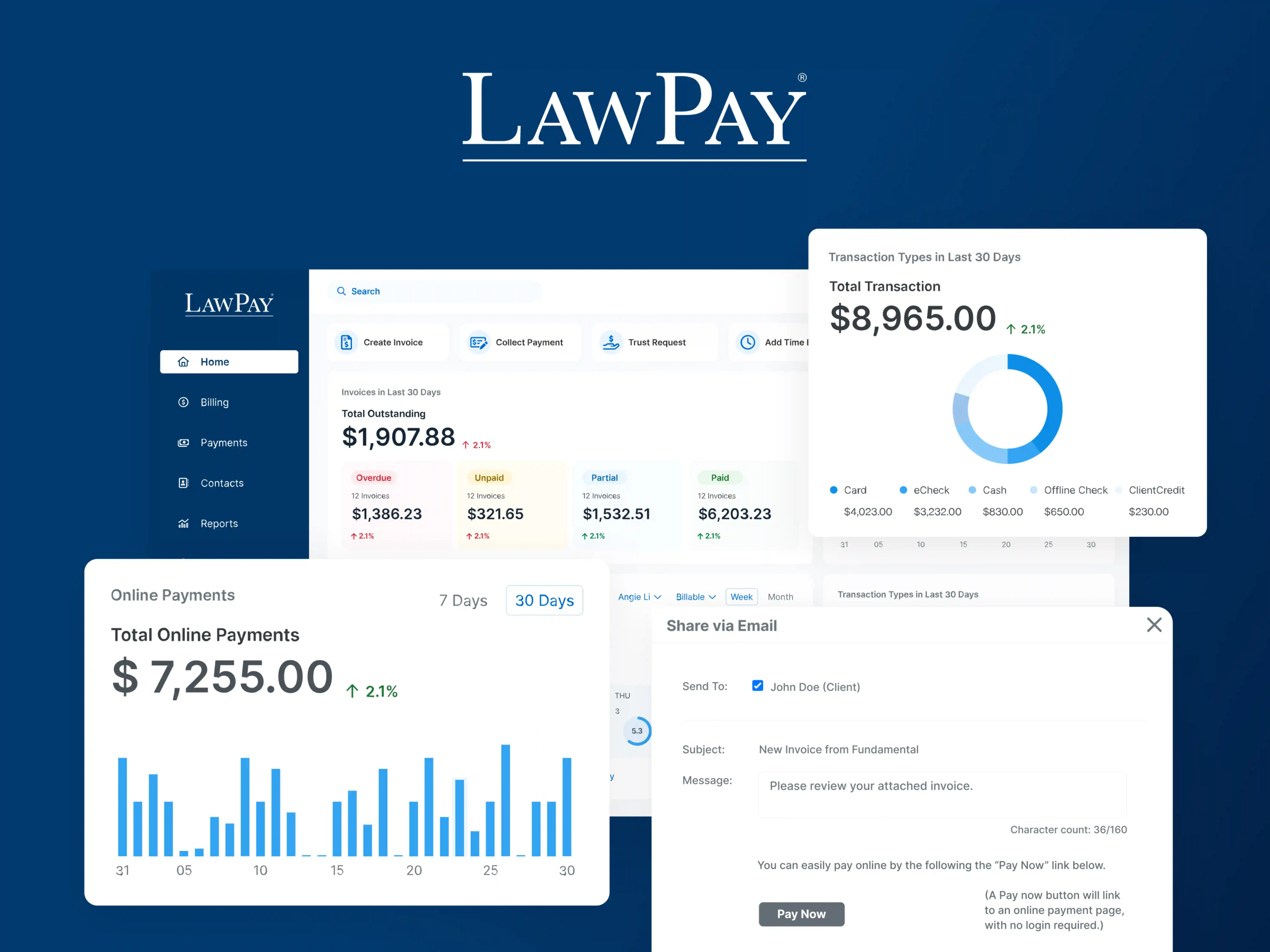To promote a positive client experience while contributing to the firm's long-term success, attorneys need to use effective billing language. Clear communication and concise, digestible billing language ensure clients understand the attorney fee agreement, reduce the likelihood of payment disputes down the road, and, ultimately, establish trust and transparency with clients regarding your firm’s billing practices.
In this guide, we’ll provide sample billing language attorneys can use in their fee agreements, share practical tips for identifying value-driven language, and highlight where this information should be implemented for a seamless billing process.
Schedule a demo to see what LawPay can offer your firm.
Book Now
Common Billing Language for Attorney Fee Agreements
Attorney fee agreements are the backbone of a smooth legal invoice process without surprises for either party.
At a minimum, your agreement should include the following payment-related topics:
Fee Basis
This section will summarize your firm's base fees. It should include descriptions of specific costs associated with referrals (e.g., the referring attorney's fee), work performed by others (such as legal assistants and clerks), new matters, and appeals. You'll also want to clarify when fees are calculated using an hourly rate or as a percentage of the amount recovered on behalf of the client.
Expenses
Here you will describe the out-of-pocket expenses for which the client is responsible. This list may include the following:
Court costs
Filing fees
Transcript fees
Deposition fee
This section should also discuss how these expenses will be deducted or recalculated, should a trust account reach zero, or if there is an insufficient recovery of funds from the client.
Calculation of Attorney Fees
Finally, you should explain how your fees are collected and the factors that are considered (such as expenses paid on behalf of your client or any fees owed to a referring attorney).
To see all three of these common billing topics in practice, download our sample attorney fee agreement.
Sample Billing Language for Attorneys: 3 Essential Examples
In addition to your fee basis, expenses, and fee calculations, there are additional topics you should consider adding to your attorney fee agreement or client intake paperwork.
Let’s look at three billing language examples for these supplementary topics next.
Attorney’s Billing Obligations
Let your clients know when they can expect invoices from your firm and what information will be included on those invoices.
Example: Attorney will provide Client, at monthly intervals, an itemized statement setting forth in reasonable detail all services by Attorney on behalf of Client, and any costs that have been incurred and/or advanced by Attorney on behalf of Client in the above-referenced matter. The invoice will also show the application of prepaid fees to the monthly invoice, and any resulting balances of prepaid fees and/or unpaid fees.
Client’s Payment Obligations
Outline the expectations regarding when the client is required to submit payment, as well as the forms of payment your firm accepts.
Example: Your legal fees are due and payable [ex: upon receipt of the billing] to be paid no later than [ex: the last day of the month] and may be satisfied with any of the following payment options:
a) By the application of funds held in the firm's trust account for prepayment of fees, which the firm shall be entitled to transfer upon invoicing
b) By paying by paper check or ACH/eCheck (automated deduction from Client's designated checking account)
c) By the use of a credit card in person or online via the firm's payment portal, provided that Client understands that by clicking "Submit Payment" the Client agrees to pay the entire payment amount for the bill selected, and authorizes the firm to charge Client's designated payment method for the payment amount
d) By paying in cash at the offices of the firm, at which time a written receipt will be generated for you
For Client's convenience, Attorney has created a portal through LawPay, a safe and secure credit card portal designed for lawyers, allowing Client to pay bills and replenish retainers online.
Promise to Pay Provision
A Promise to Pay clause helps guarantee the client understands and agrees to their contractual obligation to pay your firm for the services performed.
Example: Once services are engaged, Client recognizes that they are contractually bound to Attorney for their entire fee. All fees paid are non-refundable and must be paid in full. Client understands that fees paid through the use of a debit card, credit card, or other electronic means cannot be revoked or reversed in any manner by the client after legal services are performed. Refunds, when appropriate, shall be paid by check or other electronic funds transfer from Attorney to Client.
Overall, when your client paperwork reflects the above sample billing language, firms can reduce the likelihood of client non-payment while practicing transparency with their invoicing processes.
Additional Tips for Attorney Billing Language
Using the right legal wording for payment agreements is one of the quickest and simplest ways to improve your law firm’s billing practices.
To promote clarity and on-time payments, employ these two tips in your billing documents:
Refrain from Complicated Legal Talk
While it may be tempting to prove your value by using legalese in your onboarding paperwork, too much can open the door to confusion and misunderstanding for clients. Complex, lengthy sentences can also invite nuances and misinterpretations that don't accurately represent your billing processes or points to be made.
Instead, opt for simple language to explain legal fees and concepts. By using plain language, clients will better understand the content of your fee agreement, which in turn allows them to fulfill their obligations and have realistic expectations from you, their attorney. Concise sentence structures are also helpful in creating an agreement that is easy to follow and allows for improved retention.
Utilize Action Words
To effectively communicate the value of the services provided, billing language should include compelling action words that accurately reflect the work completed.
While many attorneys rely on generic words like "review" to describe their work, it fails to capture the full scope of their intellect, experience, and professional know-how. Instead, consider using more impactful words like the ones below:
Advise
Assess
Analyze
Compile
Develop
Evaluate
Examine
Facilitate
Inspect
Investigate
Research
Resolve
In addition to showcasing the value of your work with the above words, curating your language can also be a powerful means of showing progress within a client's case and positively reinforcing their decision to use your legal services.
When a client views your invoices over time, the language will reflect a natural progression of your work. This messaging encourages clients to move forward with payment to reach the next steps in their case's evolution while also serving as an actionable overview of completed steps.
Here are some phrase examples that demonstrate your progression:
Researching potential strategies…
Developing trial strategy…
Gathering evidence…
Engaging in negotiations…
Assessing settlement…
Ultimately, thoughtful word choice can significantly impact how clients perceive your invoices and your work. By using impactful language in your billing methods, you can reinforce a positive experience that upholds the reputation of your firm.
Where To Update Your Billing Language
Now that you have a better understanding of what effective billing language entails, it's time to update your billing templates. We'll review the three key areas where you can implement changes.
Attorney Fee Agreements
To ensure that you and your new client are on the same page from the start, begin by updating your attorney fee agreement to include the topics and sample billing language we discussed earlier. Then, review your current fee agreement and incorporate language that explains the billing process, payment schedule, and consequences for late payments.
Ultimately, the attorney fee agreement should clearly outline the terms of payment and leave no room for interpretation.
Payment Authorization Forms
Payment authorization forms are another effective tool to include in your client intake process. This document allows you to secure, in writing, not only an agreement to pay now and in the future, but also confirmation from your client that they understand and agree to your charge and refund policies.
You can draft two versions of your payment authorization forms: one to be completed by the client, and one to be completed by a third party on behalf of the client. Payment authorization forms can be for credit and debit card payments, eCheck payments, or both.
You may download each Sample Credit Card Authorization Form here:
Invoices
Finally, you may update the billing language on your invoices and reminders. Take a look at your current templates and evaluate whether they meet the criteria for clear and concise language. Consider incorporating the action words we discussed earlier to better reflect the value of your services and the natural progression of the client's case.
Start Improving Your Law Firm’s Billing Language
Schedule a demo to see what LawPay can offer your firm.
Book Now
Are you ready to improve your law firm's billing language and streamline your invoicing process?
By incorporating the tips and billing language examples outlined in this guide, you can ensure that your clients understand the terms of the fee agreement and reduce the risk of misunderstandings, late payments, and potential disputes.
With LawPay, a billing solution for lawyers, you can optimize your invoicing processes with an improved client experience. Our legal billing software allows you to easily customize billing templates, send recurring invoices, and securely accept payments online. You can also access detailed reporting and analytics to gain insights into your billing performance and identify areas for improvement.
To see how LawPay can help your firm succeed, schedule a demo today!
About the author

Gabriela JheanContent Writer
Gabriela Jhean is a Content Writer for leading legal software companies, including MyCase, Docketwise, CPACharge, CASEpeer, and LawPay—the #1 legal payment processor. She covers emerging legal technology, financial wellness for law firms, the latest industry trends, and more.
